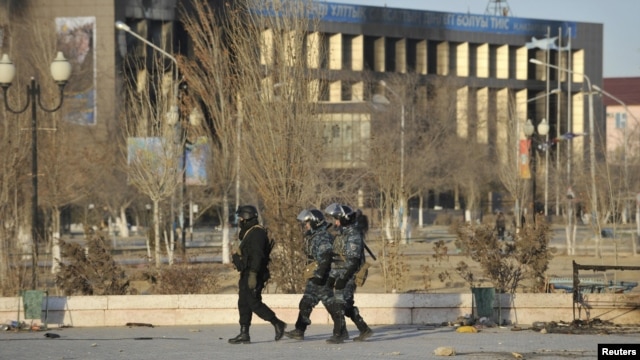HRW cites 'abusive' response to strike by Kazakh gov't, oil firms
| Publisher | Radio Free Europe/Radio Liberty |
| Publication Date | 10 September 2012 |
| Cite as | Radio Free Europe/Radio Liberty, HRW cites 'abusive' response to strike by Kazakh gov't, oil firms, 10 September 2012, available at: https://www.refworld.org/docid/5052e2d7c.html [accessed 5 June 2023] |
| Disclaimer | This is not a UNHCR publication. UNHCR is not responsible for, nor does it necessarily endorse, its content. Any views expressed are solely those of the author or publisher and do not necessarily reflect those of UNHCR, the United Nations or its Member States. |
September 10, 2012
By RFE/RL
 Kazakh Interior Ministry troops on December 19, 2011 patrol near partially burned buildings damaged in the unrest in the town of Zhanaozen three days earlier.
Kazakh Interior Ministry troops on December 19, 2011 patrol near partially burned buildings damaged in the unrest in the town of Zhanaozen three days earlier.
Leading rights group Human Rights Watch (HRW) has accused Kazakhstan's government and several oil firms of systematic violations of the rights of thousands of oil workers.
The group said in a report released on September 10 that last year's extended protests, which resulted in the eventual killing of at least 16 workers by police and thousands of layoffs, highlighted the larger issue of "disregard for workers' rights and other human rights."
The report, titled "Striking Oil, Striking Workers: Violations of Labor Rights in Kazakhstan's Oil Sector," documents how the government and three oil companies in western Kazakhstan violated the rights of oil workers to freedom of association, to organize and bargain collectively, and to freedom of speech.
"That is, interference in workers' efforts to bargain collectively, mass dismissals of workers following peaceful strikes and other violations," Mihra Rittmann of HRW, speaking to RFE/RL from Almaty, said of the violations described in the report. "We thought it was really important to look into these violations and come up with some recommendations for how the government could address workers' rights going forward."
Of the three companies named in the report, two are joint ventures: KarazhanbasMunai JSC, a Chinese-Kazakh company; and Ersai Caspian Contractor LLC, which is partially-owned by Italy's Eni. The third is Kazakh firm OzenMunaiGas.
The report, based on field research and interviews with oil workers and union leaders at the three companies, says the firms' managements and government authorities initially reacted with indifference to employees' efforts to negotiate collective agreements in May 2011 and subsequently resorted to harassment of union leaders and mass dismissals – some 2,000 people were fired from the three companies.
Thousands of workers went on strike after negotiations failed, and some declared hunger strikes. Authorities brutally broke some strikes, and several union leaders and representatives were sentenced to jail terms.
On December 16, police opened fire on a crowd in the western town of Zhanaozen, amid violence triggered by unidentified men in oil-company jackets. A total of 16 people died as a result of the incident.
After the violence, authorities cracked down on vocal oil workers and activists.
Need For Change
HRW calls on Kazakhstan to bring its labor legislation in line with international standards on collective bargaining, freedom of association, and the right to strike. It also urges the government to protect union members and stop using prosecution against them.
The report also urges Kazakhstan's foreign partners – those from the European Union in particular – not to turn a blind eye to abuses against Kazakh workers and set norms for human rights improvement in the country.
It says that international companies "should ensure that their workers, or workers employed in their subsidiary companies or other business partners, enjoy basic rights to organize, bargain collectively, and strike."
The document calls on the European Union, which is currently negotiating an enhanced partnership cooperation agreement with Kazakhstan, to establish "specific and measurable benchmarks for human rights improvement for Kazakhstan to comply with in exchange for closer ties with the bloc.
Rittmann said the agreement offers the EU and its member states substantial leverage in dealing with Astana.
"It [the European Union] has an opportunity to do much more to promote the protection of workers' rights as these negotiations are under way," Rittmann said. "Acting now will ensure that European companies that are working in Kazakhstan and European governments that are member states of the EU and investing in Kazakhstan are not benefitting from a poor right climate for workers and poor labor legislation in Kazakhstan."
Link to original story on RFE/RL website
